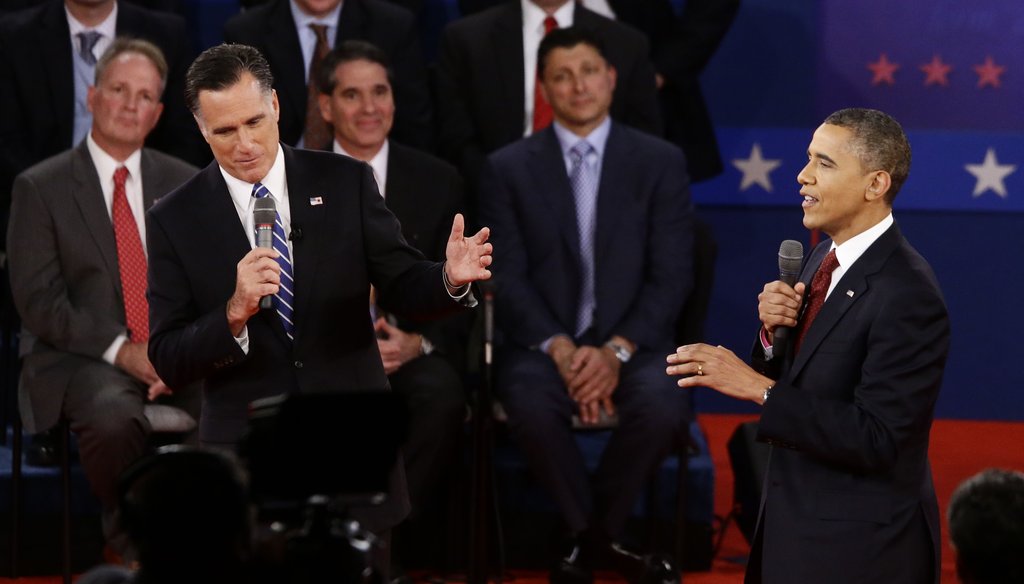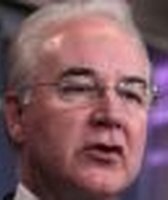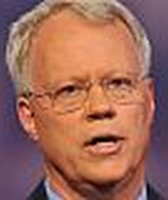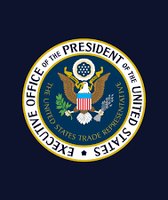Stand up for the facts!
Our only agenda is to publish the truth so you can be an informed participant in democracy.
We need your help.
I would like to contribute

Republican presidential nominee Mitt Romney (left) and President Barack Obama (right) mix it up during the Oct. 16, 2012, debate in New York.
The second presidential debate is in the books. A third and final face-to-face showdown between Mitt Romney and President Barack Obama is set for Monday.
PolitiFact and PolitiFact Georgia checked statements made by the candidates during Tuesday’s town hall-style event.
Below are some (abbreviated versions of) fact-checks on statements by the candidates or major themes they broached during their second debate.
We will be updating our online site -- http://www.politifact.com/georgia/ -- continuously as fact-checks are completed. Readers can comment on our Truth-O-Meter rulings at our Facebook page: http://www.facebook.com/politifact.georgia?fref=ts. And they can follow on Twitter at: PolitiFactGA.
Look for the complete fact-checks at the PolitiFact online sites.
Mitt Romney: Said President Barack Obama waited two weeks to call the attack in Libya "terror."
For weeks, Republicans have been hammering the Obama administration for allegedly concealing the true nature of the attack in Libya that claimed the life of the U.S. ambassador and three other Americans. During the second presidential debate, Romney charged that "it took the president 14 days before he called the attack in Benghazi an act of terror."
Obama had bristled at the idea that his administration had played politics with the attack. He called the suggestion "offensive."
Obama: "The day after the attack, governor, I stood in the Rose Garden and I told the American people ... we are going to find out exactly what happened -- that this was an act of terror -- and I also said that we're going to hunt down those who committed this crime."
We went to the transcript. On Sept. 12, the day after the attack, in the Rose Garden, Obama condemned the attack and said, "No acts of terror will ever shake the resolve of this great nation."
But in the days that followed, neither Obama nor all the members of his administration spoke consistently on the subject. There were many suggestions that the attack was part of demonstrations over an American-made video that disparaged Islam. We rated Romney's statement Half True.
President Barack Obama: Said his administration has created "5 million jobs … over the last 30 months in the private sector alone."
Early in the second debate, Obama answered a question from a young voter seeking reassurance that he will be able to find a job after he graduates.
Obama responded in part, "And what I want to do is build on the 5 million jobs that we've created over the last 30 months in the private sector alone."
If you start at the low point in the private-sector job market -- February 2010, which is 31 months ago -- then Obama has presided over the net creation of 4.7 million jobs.
But that means starting the count more than a year after Obama took office, which -- a little too conveniently for the president -- removes all of the job losses from his first year off his ledger.
A more reasonable method -- starting the count at the beginning of the recovery, which came in June 2009 -- shows a gain of 3.6 million jobs. That’s still a substantial number, but well short of the 5 million Obama claimed.
We rated the statement Half True.
President Barack Obama: Said when Mitt Romney was governor of Massachusetts, he "stood in front of a coal plant and pointed at it and said, ‘This plant kills.’"
Energy policy and gas prices garnered a lot of attention in the town hall-style debate.
"Governor, when you were governor of Massachusetts, you stood in front of a coal plant and pointed at it and said, ‘This plant kills,’ and took great pride in shutting it down. And now suddenly you're a big champion of coal," Obama said.
Romney was the newly elected governor when a showdown erupted over the coal-burning Salem Harbor Power Station. Local residents and others who wanted to keep the plant open (for jobs and tax revenue) disputed findings from Harvard scientists citing deaths and other illnesses resulting from the plant’s emissions. The spat between Romney and Salem Harbor’s owner over compliance with Massachusetts’ emissions rules turned testy.
Romney was adamant that the company comply by 2004 instead of by 2006, and he appeared at a news conference near the plant to emphasize the point. His statements that day show how he felt, and they’re documented in a video: "I will not create jobs or hold jobs that kill people, and that plant -- that plant kills people."
Obama quoted Romney accurately when he said the governor entered the controversy by saying the plant "kills people." We rated his statement True.
Mitt Romney: Said President Barack Obama broke his promise to offer a comprehensive immigration bill in his first year.
In the second presidential debate, Romney focused on the commitments that Obama failed to deliver on, including immigration reform.
"He said in his first year he'd put out an immigration plan that would deal with our immigration challenges," Romney said. "Didn't even file it."
This is one of the promises we’ve tracked in the Obamameter, and Romney is correct.
During the 2008 campaign, then-candidate Obama said he would pursue immigration reform aggressively.
In June 2009, he assigned a comprehensive immigration reform framework to be completed. In September 2009, he said he anticipated draft legislation before the year was out. A bill introduced by a Democratic representative in December 2009 was not promoted or supported by the Obama administration.
Obama continued to push for immigration reform in his speeches in 2010.
The president promised to strongly support a comprehensive immigration reform bill that would be introduced during his first year in office. He has repeatedly called for reform, and several immigration-related bills are pending in Congress. But all that we've seen are proposals and frameworks, no actual bills.
We rated Romney's statement True.
Mitt Romney: Said "Oil production is down 14 percent this year on federal land."
Romney talked about energy as a pocketbook issue, charging that the president's policies were cutting oil production on federal land.
"As a matter of fact," he said, "oil production is down 14 percent this year on federal land."
That’s similar to a statement that PolitiFact Ohio checked last April -- "Last year, we produced 14 percent less oil on public lands than we did the year before." It’s also similar to a claim we checked a few weeks later, that oil "production's down where Obama's in charge."
The statistic, from fiscal year 2011, cherry-picks the most unflattering oil production numbers under the Obama administration and ignores the impact of events well outside the president’s control: changes in technology, decades of presidential policy, and most importantly, the Deepwater Horizon spill. If you look at production since 2009, oil production rose two of three years, for a net increase of 10.6 percent.
On balance, we rated Romney's claim Half True.
President Barack Obama: Said Mitt Romney suggested that "employers should be able to make the decision as to whether or not a woman gets contraception through her insurance coverage."
Obama and Romney clashed over contraceptives coverage in their second debate.
"Now, there are some other issues that have a bearing on how women succeed in the workplace," Obama said. "For example, their health care. You know a major difference in this campaign is that Gov. Romney feels comfortable having politicians in Washington decide the health care choices that women are making.
"I think that's a mistake. In my health care bill, I said insurance companies need to provide contraceptive coverage to everybody who is insured. Because this is not just a -- a health issue, it's an economic issue for women. It makes a difference. This is money out of that family's pocket. Gov. Romney not only opposed it, he suggested that in fact employers should be able to make the decision as to whether or not a woman gets contraception through her insurance coverage."
Romney says he doesn’t believe bureaucrats or employers should make the call whether a woman can use contraceptives. But his support for the Blunt amendment, which would exempt employers from providing any service that went against their "beliefs or moral convictions," endorses the approach that employers should be able to make the decision about whether contraception is covered by employees’ insurance. We rated Obama’s claim True.
Our Sources
See articles.




















































